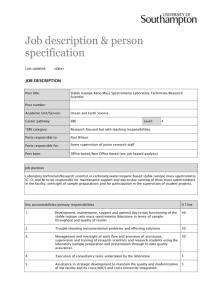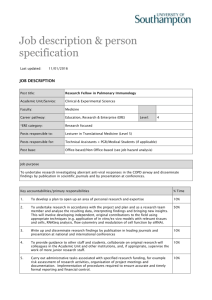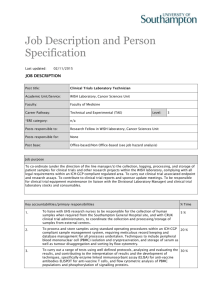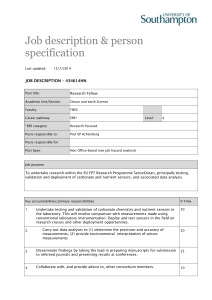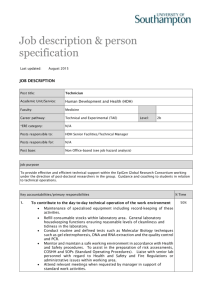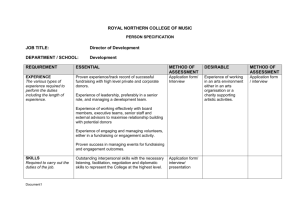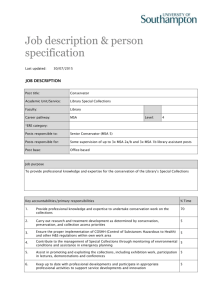Job Description and Person Specification
advertisement
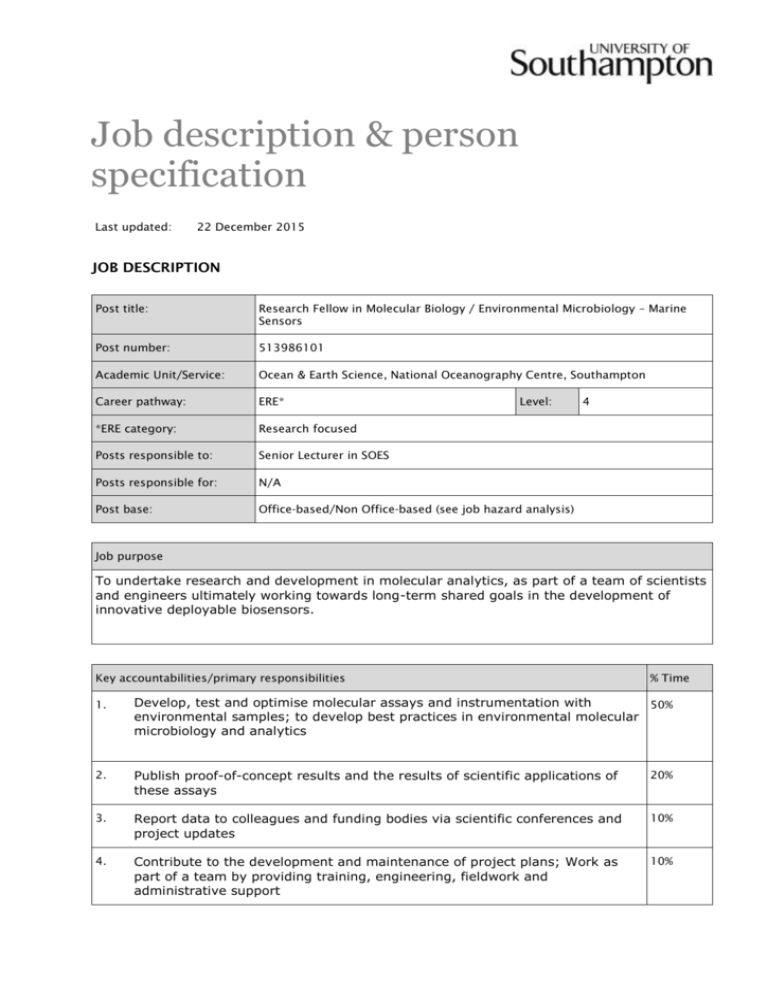
Job description & person specification Last updated: 22 December 2015 JOB DESCRIPTION Post title: Research Fellow in Molecular Biology / Environmental Microbiology – Marine Sensors Post number: 513986101 Academic Unit/Service: Ocean & Earth Science, National Oceanography Centre, Southampton Career pathway: ERE* *ERE category: Research focused Posts responsible to: Senior Lecturer in SOES Posts responsible for: N/A Post base: Office-based/Non Office-based (see job hazard analysis) Level: 4 Job purpose To undertake research and development in molecular analytics, as part of a team of scientists and engineers ultimately working towards long-term shared goals in the development of innovative deployable biosensors. Key accountabilities/primary responsibilities % Time 1. Develop, test and optimise molecular assays and instrumentation with 50% environmental samples; to develop best practices in environmental molecular microbiology and analytics 2. Publish proof-of-concept results and the results of scientific applications of these assays 20% 3. Report data to colleagues and funding bodies via scientific conferences and project updates 10% 4. Contribute to the development and maintenance of project plans; Work as part of a team by providing training, engineering, fieldwork and administrative support 10% Key accountabilities/primary responsibilities % Time 5. Train/supervise new students and colleagues on molecular analytics 5% 6. Assist with maintaining labs, equipment, supplies and infrastructure in the group 5% Internal and external relationships (including nature and purpose of relationships) Principal Investigator (PI): the PDRA will receive guidance from the PI on their research, and collaborate with the PI on the investigation. PDRA will collaborate with other institutions (Plymouth Marine Lab, Sir Alister Hardy Foundation for Ocean Science, University of Exeter, Center for Ecology and Hydrology, Center for Environment Fisheries and Aquaculture Science) to reach project goals, under the PI’s guidance. PERSON SPECIFICATION Criteria Essential Desirable Qualifications, knowledge & experience PhD or equivalent Application/Documentation/References professional qualifications and experience in Microbiology -ORDetailed understanding, knowledge of and experience using molecular biological Experience in field CV/Publications/Interview techniques sampling and environmental Experience with at least 3 microbiology bioanalytical methods (e.g. qPCR, functional CV/Publications/Interview Experience with genomics, probe fluidics / development development, etc.). of technologies Knowledge of metagenomic sequence analysis Planning & organising Document1 CV/Publications/Interview Able to organise own research activities to deadline and quality standards References Ability to manage own work schedule References Problem solving Able to develop & initiative understanding of complex scientific and engineering challenges and to be proactive and resourceful in finding solutions Management & teamwork How to be assessed References/CV/Interview Able to develop original techniques/methods References/CV/Interview Work effectively in a team, understanding the References/CV/Interview 2 strengths and weaknesses of others to achieve shared goals Able to train, mentor and supervise work of junior research staff, delegating effectively Communicating Good written and oral & influencing skills Able to present research results clearly to an audience of peers Able to write up research results for publication in leading peer-viewed journals References/CV/Interview CV/Interview CV/Interview CV Work proactively and collaboratively to achieve defined outcomes CV/References Ability to diffuse and resolve conflict References/Interview Able to effectively CV/Interview/References communicate science requirements to engineers, and to develop/ troubleshoot novel scientific solutions to engineers’ challenges Other skills & behaviours Special requirements Document1 Understanding of relevant Health & Safety issues Interview Positive attitude to colleagues and students Interview/References Interest and ability to participate in some field work. Interview 3 JOB HAZARD ANALYSIS OFFICE-BASED POST If this post is an office-based job with routine office hazards (eg: use of VDU) no further information needs to be supplied. NON-OFFICE BASED POST If this post has some hazards other than routine office (eg: more than use of VDU) please complete the analysis below. ## - HR will send a full PEHQ to all applicants for this position. ENVIRONMENTAL EXPOSURES Outside work Occasionally Frequently Constantly (<30% of time) (30-60% of time) (> 60% of time) X Extremes of temperature (eg: fridge/ furnace) ## Potential for exposure to body fluids ## Noise (greater than 80 dba - 8 hrs twa) ## Exposure to hazardous substances (eg: solvents, liquids, dust, fumes, biohazards). Specify below: X Typical molecular biological lab chemicals including phenol, chloroform (<2ml discrete volumes) and dilute acids such as 15% HCl Frequent hand washing Ionising radiation EQUIPMENT/TOOLS/MACHINES USED ## Food handling ## Driving university vehicles(eg: car/van/LGV/PCV) ## Use of latex gloves (prohibited unless specific clinical necessity) ## Vibrating tools (eg: strimmers, hammer drill, lawnmowers) PHYSICAL ABILITIES Load manual handling Repetitive crouching/kneeling/stooping Repetitive pulling/pushing Repetitive lifting Standing for prolonged periods Repetitive climbing (ie: steps, stools, ladders, stairs) Fine motor grips (eg: pipetting) X Gross motor grips Repetitive reaching below shoulder height X Repetitive reaching at shoulder height Repetitive reaching above shoulder height PSYCHOSOCIAL ISSUES Face to face contact with public Lone working ## Shift work/night work/on call duties Document1 4
